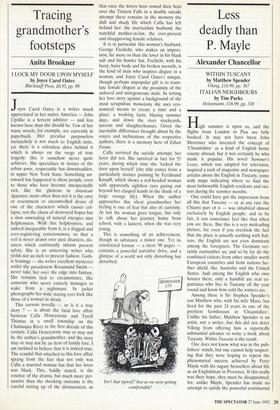Tracing grandmother's footsteps
Anita Brookner
I LOCK MY DOOR UPON MYSELF by Joyce Carol Oates Blackstaff Press, £6.95, pp. 98 Joyce Carol Oates is a writer much appreciated in her native America — John Updike is a fervent admirer — and less known here than she should be. Few of her many novels, for example, are currently in paperback. Her peculiar purposeless melancholy is not much to English taste, yet there is a relentless drive behind it which is always on the verge of true tragedy: this it somehow never quite achieves. She specialises in stories of the urban poor, respectable but downtrodden, in upper New York State. Something un- toward has happened to these people, even to those who have become unexpectedly rich, like the gluttons in American Appetites: more often than not it is the envy or resentment or uncontrolled desire of one of the characters which causes col- lapse, not the chaos of destroyed hopes but a slow unwinding of natural energies into helplessness. With this helplessness, and indeed inseparable from it, is a dogged and ever-registering consciousness, so that a veil is never drawn over past disasters, dis- asters which continually inform present safety. She is an unnerving writer who yields not an inch to present fashion. Goth- ic leanings — she writes excellent mysteries under the pseudonym Rosamund Smith never take her over the edge into fantasy. She remains tied to circumstance, like someone who never entirely manages to wake from a nightmare. In jacket photographs her wide staring eyes look like those of a woman in shock.
This curious novella — or is it a true story ? — is about the fatal love affair between Calla Honeystone and Tyrell Thomas in a small township on the Chatauqua River in the first decade of this century. Calla Honeystone may or may not be the author's grandmother, and the story may or may not be an item of family lore. I am inclined to believe that it is indeed true. The scandal that attached to this love affair sprang from the fact that not only was Calla a married woman but that her lover was black. This, baldly stated, is the essence of the drama, but much more per- suasive than the shocking outcome is the careful setting up of the denouement, so that once the lovers have rowed their boat over the Tintern Falls in a double suicide attempt there remains in the memory the dull and shady life which Calla has left behind her: the inarticulate husband, the watchful mother-in-law, the ever-present and disapproving female relatives.
It is in particular this woman's husband, George Freilicht, who makes an impres- sion, far more so than the lover in his black suit and his bowler hat. Freilicht, with his fuzzy, hairy body and his broken toenails, is the kind of man who inspires disgust in a woman, and Joyce Carol Oates's unique, though perhaps unpopular gift is to trans- late female disgust at the proximity of the unloved and unregenerate male. In setting her love story against a background of the most scrupulous monotony she uses eco- nomical means to create a time and a place: a working farm, blazing summer days, and down the river stockyards, taverns and slaughterhouses. Given the inevitable differences brought about by the voices and inclinations of the respective authors, there is a memory here of Ethan Frome.
Calla survived the suicide attempt; her lover did not. She survived in fact for 55 years, during which time she 'locked the door upon herself(the title comes from a particularly sinister painting by Ferdinand Knopff, which shows a red-headed woman with apparently sightless eyes gazing out beyond her clasped hands in the shade of a large orange lily). When the author approaches this silent grandmother her feeling is one of fear but also of curiosity. At last the woman gives tongue, but only to talk about her journey home from school, with a lantern, when she was very young.
This is something of an achievement, though in substance a minor one. Yet its constricted format — a mere 98 pages contains a powerful narrative drive, and a glimpse of a world not only disturbing but disturbed.
Isn't that typical? Just as we were getting comfortable!


















































 Previous page
Previous page